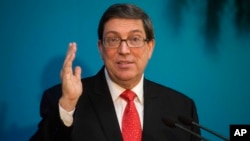Cuban Foreign Minister Bruno Rodriguez said on Wednesday the United States was on a path of confrontation amid signs Washington will further tighten decades-old sanctions on the Communist-run island.
U.S.-Cuban relations have deteriorated sharply since Donald Trump became president, returning to Cold War characterizations of Cuba and tightening trade and travel restrictions that had been eased by his predecessor Barack Obama.
Under Obama and former Cuban President Raul Castro, the United States and Cuba had restored diplomatic relations and forged a closer relationship.
"We regret the U.S. government is advancing on a course of confrontation with Cuba," Rodriguez told a 1-1/2 hour news conference in Havana.
Last week a senior Trump administration official said the White House planned to ramp up economic pressure on Cuba's military and intelligence services, as well as on Venezuela.
Rodriguez also accused the United States of pressuring countries to reject a resolution Cuba will present at the U.N. General Assembly next week for the 27th year calling for an end to the U.S. economic embargo on the country.
He said Washington was trying to use human rights as a pretext to justify the embargo that itself "violates the human rights of the Cuban people."
Last week the United States presented a campaign on the plight of Cuban political prisoners at the United Nations.
Protesting Cuban and Bolivian diplomats drowned out the launch by shouting, chanting and banging their hands on desks. The United Nations has traditionally voted overwhelmingly to condemn the embargo. Last year, the resolution was adopted by the 193-member General Assembly with 191 votes in favor.
Only the United States and Israel rejected the resolution which is non-binding but can carry political weight. Only the U.S. Congress can lift the full embargo, put in place more than 50 years ago.





